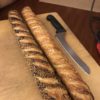Alan Kaufman: Horseradish is a root. It sort of grows in the ground like a carrot. With the Jewish religion it’s a bitter herb. We use it for Passover to shed tears for the suffering of the Jews when we left Egypt.
Brendan Francis Newnam: When you’re getting horseradish is there anything you look for?
Alan Kaufman: Well, when we buy our horseradish, we try to find the biggest and fattest roots. We try to find them with green tops on top, not dried off, the green is nice and fresh so you know it wasn’t laying around anywhere. And most of the time it always has a little bit of mud around it so we know it’s freshly picked.
Brendan Francis Newnam: It’s the dirt that makes you select it?
Alan Kaufman: That way, you know, if it’s dry and there’s no dirt or mud on there, you know it’s been sitting around for awhile and we want the hottest so we go for the fresh ground.
Brendan Francis Newnam: So the fresh stuff gives you the most heat?
Alan Kaufman: Yes, yes, yes!
We get our horseradish from St. Louis, Missouri. That’s the best horseradish you get, horseradish that comes from Mississippi or Missouri because it’s grown in the Mississippi river right by the mud, so it’s the best horseradish you can get.
Brendan Francis Newnam: So horseradishes like mud?
Alan Kaufman: It likes mud. Yes. It likes that moisture.
Brendan Francis Newnam: So, you’re The Pickle Guys and behind you are barrels and barrels of great pickled things. Why horseradish and pickles?
Alan Kaufman: The old timers that started it in 1910, they would fill in with horseradish because at that time they only had like three or four barrels of items. Today we’ve got about 35 different types of barrels here. So, in the holiday time they would make russel borscht, which is what we also do, and then they would make the horseradish for Passover. So, people don’t have to go in their house, grate the horseradish, and make everybody in the house cry.
Brendan Francis Newnam: So do a lot of people come up and ask for a sample?
Alan Kaufman: Yeah, a lot of people. A lot of people don’t believe it’s hot and then when they eat it they go, “Wow! That’s hot.”

Brendan Francis Newnam: So tell me what’s going on here.
Alan Kaufman: Right now Chris is going to grind up some horseradish. We have some peeled, cleaned horseradish roots. He’s going to put it into a horseradish grater and it’s going to grate the horseradish very fine, I guess would be the only word.
Brendan Francis Newnam: And is this specifically made for grinding horseradish?
Alan Kaufman: This is actually made for grinding cheese.
Brendan Francis Newnam: Chris has a gas mask on. Is that because he’s a psychopath?
Alan Kaufman: He’s a little psycho anyway, but he’s going to grate horseradish for ten hours a day for two weeks straight. It’s the only way to keep him same from not running up and down the block and ripping his clothes off.
Brendan Francis Newnam: Is this going to make me cry?
Alan Kaufman: You bet it is.
Brendan Francis Newnam: Chris, is this going to make me cry?
Chris: Yes, it is.
Brendan Francis Newnam: That smells good.
Alan Kaufman: Yeah, now take a whiff. Take a whiff of that.
Brendan Francis Newnam: Woo. Oh, there we go.
Alan Kaufman: See there? It’s working. Now you know why he wears a gas mask.
Brendan Francis Newnam: It was like World War I in the trenches there.
Alan Kaufman: That’s right. Mustard gas.
Brendan Francis Newnam: All right, so he’s got a bowl of it here. It looks like Parmesan cheese but it’s moist and now he is… Now you’re putting it in to something? What’s going on here?
Alan Kaufman: He’s going to put it into another bucket. That’s the bucket we mix it in. He’s going to add white vinegar. Actually, it’s apple cider vinegar. For Passover we use apple cider vinegar. Then he’s going to mix it up until it’s sort of like a mashed potato consistency and then he’s going to put them in jars, bottle them in jars.
Brendan Francis Newnam: So the apple cider vinegar because that’s kosher?
Alan Kaufman: Apple cider vinegar is kosher for Passover. If you’re going to make it all year round, you use just regular white distilled vinegar.
Brendan Francis Newnam: Isn’t this whole process rabbinically supervised?
Alan Kaufman: Everything here is under the supervision of Rabbi Shmuel Fisheli, who is also Rabbi David Feinstein’s son-in-law, and he comes here at least twice a week to check on everything.
Brendan Francis Newnam: Does he wear a gas mask?
Alan Kaufman: He doesn’t wear a gas mask. He doesn’t stay long. We chase him out with the horseradish.
Brendan Francis Newnam: So you put it in there and how long does it sit inside?
Alan Kaufman: Once he makes it like a mashed potato consistency and he puts it in the jar, it can stay in that jar for four to six months and still have a lot of heat. They add either beet juice to it to make it red horseradish or we use apple cider vinegar to make it white horseradish.
Brendan Francis Newnam: Is there going to be a flavor difference between the red and white?
Alan Kaufman: Yes. Between the red and the white, the red will be a little sweeter. Most people use red horseradish for gefilte fish, because that way you can see how much horseradish you put on the gefilte fish. If you use the white you really can’t tell.
Brendan Francis Newnam: Are you tired of horseradish? Like by the end of the season do you not touch it for another year?
Alan Kaufman:
The fresh ground we only make once a year and every year I look forward to making it, and every year when I start making it I try it and I go, “Wow, that’s hot!”Then ten minutes later I try it again and I go, “Wow, that’s hot!” By the end of the season I’m pretty much done with horseradish. I don’t want to see it no more.
Brendan Francis Newnam: Like, “I’ve cried my bitter tears.” You’re like, “I’m definitely not going back to slavery in Egypt.”
Alan Kaufman: Yeah, yeah, exactly. It will never happen. That and the matzah. I don’t know how those guys did it for 40 years with the matzah. Now you know why my people are unhappy.



